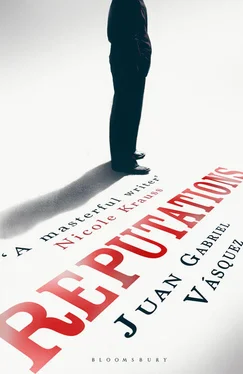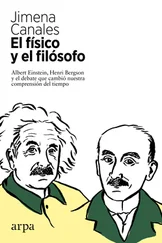‘Ask what?’
‘About the gentleman you were looking for. I can ask my colleagues, it’s no trouble.’
Mallarino didn’t say no, he waved his hand in the air as if erasing the last words, and stammered a thank-you. But he liked the man, his natural courtesy, his good manners: endangered species in this inelegant, sour-faced, coarse Bogotá, hardly the South American Athens it used to flatter itself as being. Who had said that in Bogotá even the bootblacks quoted Proust? Must have been some Englishman, Mallarino said to himself, only an Englishman would be capable of perpetrating such a pronouncement. Of course, it had been said some time ago: said in another city, the disappeared city, the phantom city, the city of Ricardo Rendón, the city of La Gran Vía, the entrance of which Mallarino could have seen, a few decades ago, from the spot on the pavement where he now lingered distractedly, a short step from the hostile roadway, his gaze lost between the short buses with their brightly lit windows. But the place had disappeared. Many shops and many cafés had disappeared, La Gran Vía among them. Had Rendón’s ghost emerged from that phantom door? But it wasn’t a ghost: someone dressed like Rendón, someone resembling Rendón, with the same wide-brimmed hat, with the same unruly bow tie: that was all. Maybe, thought Mallarino, it was the proximity to La Gran Vía or to its former location that had set off that vision, or maybe it was one of those false memories we all have. What a strange thing memory is, allowing us to remember what we have not experienced. Mallarino clearly remembered Rendón strolling through the centre of Bogotá, meeting León de Greiff in El Automático, arriving home, drunk and alone and sad, in the early hours. . Fictitious memories, invented memories. There was no reason to be surprised: it was impossible, on a day like today, to pretend that Rendón had no part in his thoughts. The gentleman you were looking for. No, he wasn’t actually looking for him: rather he was on his way to replace him, to occupy his throne or inherit his sceptre or whatever imbecilic metaphor like the ones he’d read in two or three opinion columns by people as well informed as they were affected, as good at remembering as at brown-nosing. ‘It’s a poor sort of memory that only works backwards’: some free association had brought that phrase to mind. Where was it from, and what was it referring to? But then he stopped thinking of it, because he’d glanced again at his watch and the angle of the hands turned into a reproach: was he even going to arrive late for his own coronation?
He began to walk against the flow of the crowd along Seventh Avenue, crossing Jiménez Avenue and Rosario Square into Candelaria, dodging street vendors determined to sell everything that could be sold — buy cigarettes, buy cheap gold, buy toy cars or polished emeralds, buy umbrellas or shoelaces, buy lollipops with chewing gum centres, chewing gum without lollipops, chocolate-covered raisins — and thinking that in downtown Bogotá one always had the sensation of walking against the flow, the afternoon crowds like a strong wind across the bow. Determined to overcome the resistance, Mallarino lowered his head, raised his shoulders and stuck his hands in the pockets of his raincoat, the unfathomable depths of which never ceased to surprise him. And that’s what he was thinking about, the nooks of his raincoat he seemed not to have completely explored, when he heard the clicking of high heels behind him, or rather he realized he’d heard it when the heel-clicking ended with a hand on his shoulder, as delicate as a falling leaf, and turned round, half surprised and half curious, to find the face of Magdalena, her hair so fair the grey ones blended in, her slender eyebrows arched and her smile ironic: the whole landscape of features Mallarino had once known the way he now knew the view from his window.
‘I think we’re going to the same place,’ she said.
There was no resentment in her voice: rather a kindness resembling something forgiven or perhaps forgotten (but Magdalena’s voice had always been capable of all kinds of sorcery). Mallarino kissed her on the cheek and remembered her perfume and something awoke in his chest. Of course, Magdalena’s radio station was nearby.
‘I think you’re right,’ he said. ‘If you want I’ll walk you there.’ She smiled and took his arm, or linked her arm through Mallarino’s, like she did when they were married and used to go for walks together in town, before they’d allowed life, headstrong life, to have its own way.
‘Typical of you,’ she said, ‘to arrive on foot.’
She’d noticed. Magdalena always noticed: she’d always been that way. Her liquid eyes — today, for some reason, brighter than he remembered them — saw everything, took everything in.
‘What do you expect,’ said Mallarino. ‘At our age, a person’s not going to change.’
When they got married, in a small-town church with limestone walls and cobbled steps leading into the square and where one could easily turn an ankle, Mallarino had been drawing cartoons for just under a year — two a month, with luck — for a newspaper with Conservative tendencies and family capital, one of those publications that never become leaders in the field but seem to have always existed and whose editions aren’t sold by the street vendors, but show up in the drugstores and cafés when everyone’s forgotten all about them. That minor job — Mallarino thought, with involuntary scorn — did not form part of his great projects: if he’d dropped out of his architecture course before completing the second year, if he’d refused to use his father’s contacts to get a job without a diploma in one of the important firms, it had been to pursue his true vocation, or to make the most of his virtuosity, for even his parents had to bow to the evidence of his talent on the afternoon the painter Alejandro Obregón, who at that time was working on his oil paintings of doves in a third-floor apartment at Twelfth Avenue and Seventeenth Street, visited the family home, stood in front of a life-size nude Mallarino was drying with a portable hairdryer, and exclaimed a ten-word sentence that was like a bullfighter authorizing a novice to take his place in the ring: ‘But how the hell did this kid learn to paint?’
Painting was his thing. The future (the ghosts that appeared in his head when he pronounced this word) was on canvas. So at that time the political cartoons were a short-term way of earning a living, getting by while large frames piled up in the courtyard and the house filled with the smell of turpentine, and canvases covered in female forms, all more or less disguised versions of Magdalena, changed colour according to the moods of the light coming through the windows. The newspaper paid him badly and late, and only when they actually used one of his drawings: it was not unusual for Mallarino to send five or six cartoons a week and receive them back at the end of the month with a note typed by a secretary, on embossed letterhead, in which the opinion-page editor regretted in too many words not being able to use his work this time. At the age of twenty-five, Mallarino did not yet know that this was common practice in the country’s newsrooms; Magdalena didn’t know either, but she was the one to suggest sending just one cartoon and not sending another until the first was published.
‘And if they don’t publish it?’ said Mallarino.
‘We’ll just wait till they do,’ she said.
‘But the moment passes. Cartoons are like fish: if they’re not used today, they can’t be used tomorrow.’
‘Well, that may well be the case,’ said Magdalena, concluding the subject. ‘But that’s also their problem.’
And of course, she was right. Subjected to rationing, the newspaper began to publish everything Mallarino sent, and even to increase the frequency of his appearances. For five months the situation was ideal. Then, in the month of August, the Colombian President and the Chilean President signed a joint declaration in which both countries officially expressed their respect for ideological diversity. Mallarino drew them both, the Colombian with his permanent involuntary smile and the Chilean with his thick-framed, tinted glasses. ‘Look, my dear Salvador, in Colombia it doesn’t matter if you’re Liberal or Conservative,’ read the first line of the text. And the second: ‘What matters is that you come from a good family.’ The drawing was finished in one draft, and Mallarino left it at the front desk of the newspaper, well sealed inside a cardboard envelope, inside a plastic bag from the market (it had been drizzling). But the next day, when he opened the newspaper, he found that the second line of the text had disappeared, and its absence was like a crack in the earth, a drain down which everything seeps away. ‘I want someone to explain it,’ he said that afternoon in the editorial office: he’d arrived by taxi, because his urgency warranted it, with the newspaper rolled up like a telescope and wrinkled in his sweaty fist. He didn’t want his voice to tremble; to prevent it, he tried raising it, but the result was not good.
Читать дальше












